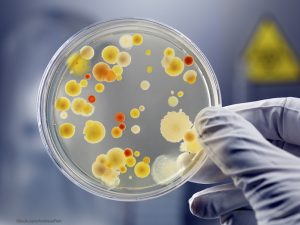Staphylococcus bacteria can cause food poisoning when a person who carries it contaminates food and then that food is not refrigerated properly. The bacteria multiply quickly at temperatures over 40 degrees F and produce a toxin that makes you sick. Scientists at the National Institutes of Health may have found an alternative strategy to fight this bacteria; by deleting a certain protein in white blood cells.
 The protein Olfm4 or olfactomedin 4 interferes with white blood cell’s ability to kill bacteria. A treatment may be developed that removes this protein, and that may make other therapies more effective. This strategy may be important as more bacteria develop resistance to antibiotics.
The protein Olfm4 or olfactomedin 4 interferes with white blood cell’s ability to kill bacteria. A treatment may be developed that removes this protein, and that may make other therapies more effective. This strategy may be important as more bacteria develop resistance to antibiotics.
Dr. Griffin P. Rodgers, director of the National Institute of Diabetes and Digestive and Kidney Diseases said in a statement, “over the year, MRSA (methicillin-resistant Staphylococcus aureus) and other bacteria have evolved to be resistant to many antibiotics. This study suggests an alternative approach to combat infection by strengthening white blood cell capabilities from within the cells, in addition to resorting to traditional antibiotic treatment.”
The treatment may be through an antibody or small molecule put into a drug that could inhibit Olfm4 activity. The next step is to find out how changing Olfm4 levels in white blood cells enhances immunity to and from drug-resistant bacteria.




